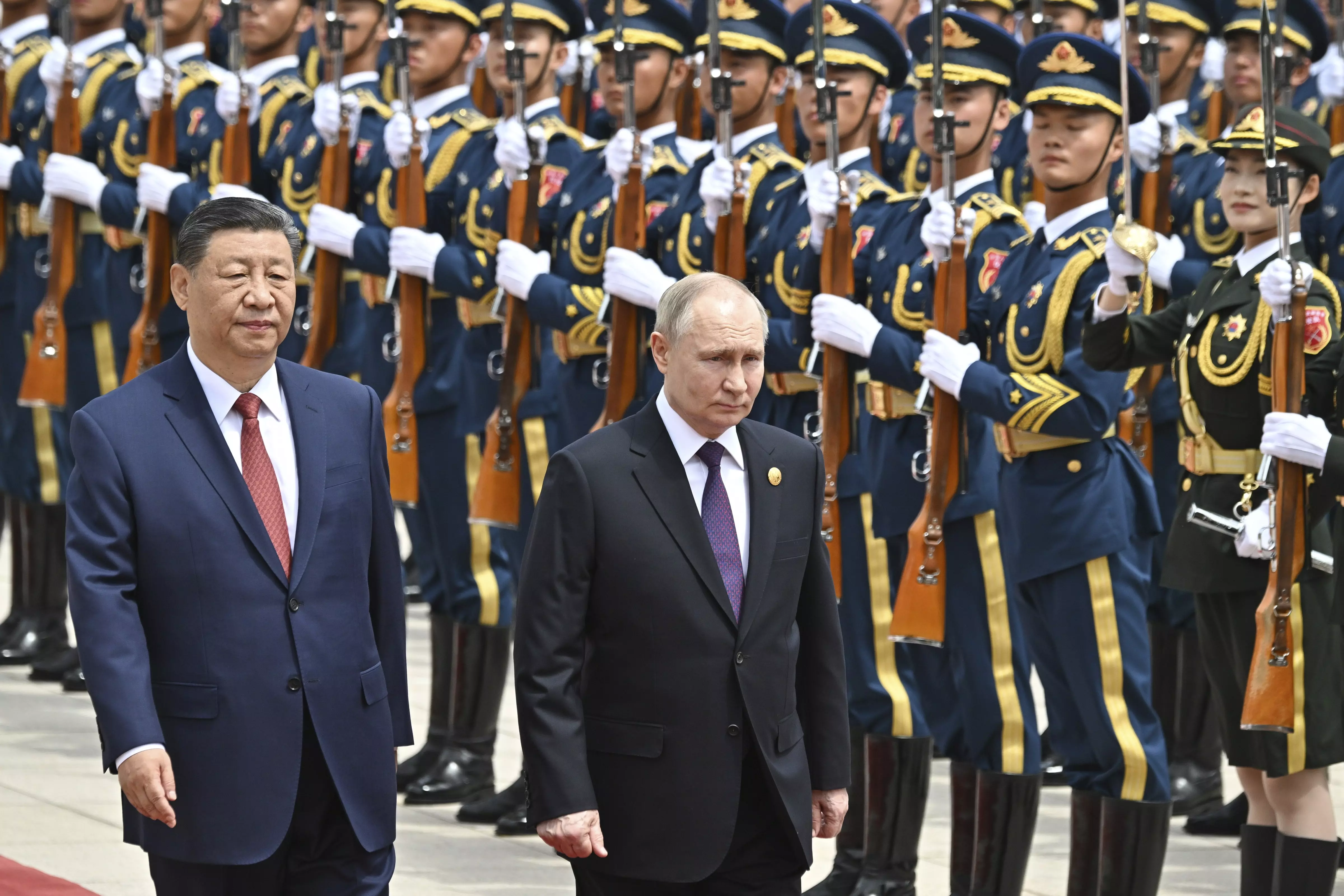
Chinese President Xi Jinping, left, and Russian President Vladimir Putin review the guard of honour during an official welcome ceremony in Beijing, China, on Thursday, May 16. AP/PTI
What is Russian President Vladimir Putin doing in China?
Putin arrived in Beijing on his first foreign visit, days after being re-elected for the fifth term in power in the midst of Russia’s raging war with Ukraine

Russian President Vladimir Putin's visit to China starting Thursday (May 16) underlines an increasingly close partnership between the two allies who oppose the US-led democratic order.
Putin arrived in Beijing on his first foreign visit, days after being re-elected for the fifth term in power in the midst of Russia’s raging war with Ukraine.
Guard of honour
Soon after Putin arrived at the historic Great Hall of People, the seat of power of the ruling Chinese Communist Party, Xi Jinping held a welcome ceremony which included a guard of honour by the People's Liberation Army (PLA) contingent. After 15 minutes’ ceremony the two leaders, who over the years have become close friends and allies, went in for talks.
Highlighting the significance of Putin’s visit, Yury Ushakov, the Russian presidential foreign policy aide, said that China was not randomly chosen for Putin's first foreign trip, but as a response to a similar gesture of friendship made by Xi last year after his election for an unprecedented third term.
Ushakov said that the most important part of the Beijing talks will be informal in a closed-door setting. In the ‘1+4 format’ on each side, the two leaders will hold substantial talks on Ukraine, he said.
Large delegation
The Russian president has brought a large delegation consisting of five deputy prime ministers, heads of economic, diplomatic and security agencies, as well as heads of the Federal Service for Military-Technical Cooperation, Russian Railways, Rosatom State Nuclear Energy Corporation and the Roscosmos State Corporation for Space Activities, Russian news agency Tass reported.
In addition, senior officials from 20 Russian regions are also accompanying Putin.
The bilateral talks are expected to focus on trade and economic cooperation, besides the strategic environment arising from Putin's war over Ukraine, which also brought pressure on China from the US and EU to distance itself from Moscow.
China has become the largest beneficiary of Russia’s oil and gas during the Ukraine war.
Here is what you need to know about Russia-China ties and Putin's visit to China
1. Diplomatic support and economic ties: China, led by President Xi Jinping, has provided important diplomatic support to Russia following its invasion of Ukraine. China has also become a key export market for Russian oil and gas, helping to sustain Russia's economy during the conflict. Additionally, Russia relies on China for high-tech imports necessary for its military operations.
2. Historical context: Despite being former Communist rivals, Russia and China have strengthened their relationship in recent years. Putin and Xi have developed a close personal bond through frequent meetings and exchanges, reinforcing their "strategic partnership" in the face of rising tensions with the West.
3. Partnership against the West: Both Xi and Putin view Western efforts to promote democracy as threats to their regimes. They believe authoritarian systems are better suited to confront modern challenges, leading them to align against the US-led democratic order. While China hasn't provided Russia with arms to use in Ukraine, it has backed Moscow diplomatically, blaming the West for threatening Russia's security. China also has strongly condemned Western sanctions against Moscow. Russia, in turn, has consistently voiced support for Beijing on issues related to Taiwan.
4. Economic interdependence: China has become Russia's top energy customer, filling the gap left by Western countries halting their imports. In return, China supplies Russia with machinery and electronics crucial for its military capabilities, particularly after facing sanctions from the West.
5. Military cooperation: The alliance extends to military cooperation, with Russia sharing sensitive military technology with China. This includes advanced systems such as an early warning system for ballistic missile launches, previously exclusive to Russia and the US. The US says China has greatly expanded supplies of machine tools, microelectronics and other technology to Russia that is used to make missiles, tanks, aircraft and other weapons.
6. China's position on Ukraine: China maintains neutrality in the Ukrainian conflict, refraining from condemning Russia's actions and blaming the West for the hostilities. Beijing blames the hostilities on the West and also strongly criticises economic sanctions on Russia. Beijing also proposed a peace plan aligning with Moscow's arguments. However, this plan was rejected by Ukraine and the West. China also has turned a cold shoulder to a Ukraine peace conference that is set to be hosted by Switzerland in June and snubs Russia. Beijing has said it supports a conference that's accepted by both Russia and Ukraine.
7. Future outlook: Putin's upcoming visit to China underscores the deepening partnership between the two nations. Their shared opposition to the US-led democratic order and growing economic and military ties signal a massive geopolitical shift with implications for global stability.
(With inputs from agencies)

